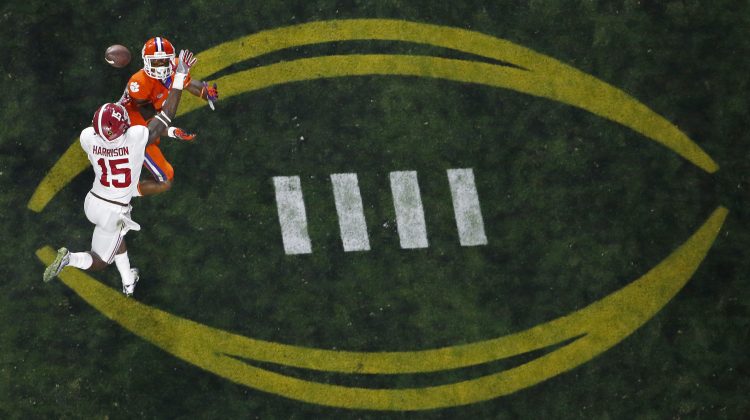On Jan. 10, hours after news broke that College Football Playoff expansion likely would be delayed for years, the Pac-12 released a statement that said, effectively: Don’t blame us.
“The Pac-12 is strongly in favor of CFP expansion,” it read, “and we support all of the six most-discussed expansion models that would allow for expansion to occur in time for the final two years of the current CFP agreement.”
The five-paragraph statement then listed the options under discussion before noting: “Every conference other than the Pac-12 has indicated that they would be against at least one of the proposed models.”
The proactive attempt to gain control of the narrative seemed to work as designed for the conference all the way until Friday, when thunderous news called into question the Pac-12’s stance and statement.
The day began with the jarring announcement by the CFP that expansion has been officially shelved for the current contract cycle (through the 2025 season).
The day ended with the revelation that the Pac-12 had, in fact, voted in favor of the shelving.
Mississippi State president Mark Keenum, chair of the CFP Board of Managers, told Sports Illustrated that an 8-3 vote back on Jan. 10 — the day of the national championship game — delivered the final blow.
(Unanimous approval from the 11 CFP members was required to expand the playoff during the last four years of the current contract cycle.)
The three leagues that drove the spike, Keenum explained, were the ACC, the Big Ten … and the Pac-12.
That’s right: Hours before its public act of self-exoneration, the Pac-12 had voted against expansion.
Either the conference was guilty of momentous hypocrisy, or a plausible explanation was buried under a heap of complexity and internecine politics.
The Hotline’s search for the truth began immediately. We asked the conference to explain the apparent contradiction, to justify its statement — “We support all of the six most-discussed expansion models” — in the wake of Keenum’s reveal of the votes and the underlying issues.
Pac-12 commissioner George Kliavkoff declined to comment on any details and instead offered the following statement:
“I am disheartened that the trust built in the CFP room is being injured by the disclosure of incomplete and therefore inaccurate information about the voting and issues that kept the CFP group from agreeing on expansion.”
Clearly, Kliavkoff didn’t appreciate Keenum hauling the CFP’s laundry into broad daylight. But to disclose details would be to commit the same trust-busting act himself.
So we went back to the Pac-12’s original statement — the Jan. 10 attempt to shape the expansion narrative. While it provides detail on all six expansion models, two issues vital to the overall calculation are conspicuous by their absence: There is no mention of its stance on the Rose Bowl’s role in the expanded playoff or the revenue distribution model.
(An expanded CFP in the 2024-25 seasons reportedly could have generated $450 million to the participating conferences.)
However, our sleuthing into the night proved fruitful. As Harrison Ford’s character in The Fugitive tells Tommy Lee Jones on the phone after discovering the picture in the one-armed man’s apartment: “I am trying to solve a puzzle … And I just found a big piece.”
Both issues, the Rose Bowl and the revenue distribution, were discussed at length on Jan. 21, during an interview on the ‘Paul Finebaum Show’ on ESPN.
And they were discussed by none other than Kliavkoff.
— On the Rose Bowl.
The expansion proposal called for each of the six major New Year’s bowls to host quarterfinal matchups two out of every three years, on or around Jan. 1. In the third year, each bowl would serve as a semifinal game the following week.
Kliavkoff told Finebaum that he has “a fiduciary obligation” to the Rose Bowl, “as does the Big Ten.”
“What we’re asking for for the Rose Bowl is a tiny little ask,’’ he explained. “One out of every three years, they would be hosting a semifinal. They want the right to host a traditional Rose Bowl game if they want to.”
In other words: A non-playoff Rose Bowl would be staged in the standard 2 p.m. (Pacific) slot on New Year’s Day when the Rose Bowl was hosting a semifinal the following week.
“If they do,” Kliavkoff explained, “the value of that Rose Bowl would be significantly decreased, because if you put 12 teams into the playoff, they don’t get our best against the best team from the Big Ten …
“To balance out what they giving up, we’ve asked that three hours out of every three years be protected against having to compete (on television) against a CFP quarterfinal.
“And everything we’ve asked for for the Rose, a tiny little ask, if the other contract bowls — if the Sugar Bowl, if the Orange Bowl want similar accommodations when they’re hosting a semifinal, we’d be willing to give into that, as well. It’s three hours every three years we’re asking for protection on.” (Full interview here.)
— On the revenue distribution.
Under the current 12-year format, which runs through the 2025 season, the Power Five conference take equal shares of a baseline amount in the contract with ESPN (approximately $65 million per conference per year).
But what about the financial model for the next contract cycle?
“Today, we have no contractual commitment, no grant-of-rights beyond Year 12. The whole thing goes away beyond Year 12 if we don’t come to an agreement,” Kliavkoff told Finebaum.
“So I’ve asked to have a discussion about what the revenue splits look like beyond Year 12, if we’re going to agree to extend. I’ve never signed a contract in my life where I don’t know the financial terms, but I’ve agreed to sign the contract.”
Kliavkoff didn’t elaborate on the revenue discussion within the CFP boardroom, but it’s hardly an insignificant piece to the expansion proposal.
The number of teams … the process for determining automatic berths … the revenue splits — those are the three whoppers, folks.
The Rose Bowl, in our view, is only an obstacle so long as there are other obstacles. Its request alone won’t hold up the process. (Imagine the blowback if that were the case.)
So it would appear the Pac-12 does, in fact, support all six of the expansion models, as it explained in the Jan. 10 statement.
But the conference seemingly voted against expansion hours prior to issuing the statement because it lacked clarity with the Rose Bowl’s role and, more importantly, with the revenue distribution formula starting in Year 13 (the 2026 season), when a new contract cycle begins.
What portion of the windfall would be allocated to the Power Five? How much would be set aside for the Group of Five? Would the terms in the current deal simply be extended?s
At least, that’s our best guess.
Whether the same issues prompted the ACC and Big Ten vote against expansion, we cannot say.
Big Ten commissioner Kevin Warren favors automatic bids for the Power Five champions — the Pac-12 is flexible on that issue — while ACC commissioner Jim Phillips said in December that his conference is opposed to expansion in any form for the time being.
But neither the Big Ten or ACC offered a public statement supporting all expansion formats the same day it voted against expansion, which makes Pac-12’s situation unique.
Given the absence of any reference to the revenue model in the statement and Kliavkoff’s subsequent comment to Finebaum — “I’ve never signed a contract in my life where I don’t know the financial terms” — all signs point to that issue as the reason the conference’s public stance didn’t match its (formerly) private vote.
What we have, it seems, is a mystery wrapped in a riddle … wrapped in a paycheck.
Support the Hotline: Receive three months of unlimited access for just 99 cents. Yep, that’s 99 cents for 90 days, with the option to cancel anytime. Details are here, and thanks for your support.
*** Send suggestions, comments and tips (confidentiality guaranteed) to pac12hotline@bayareanewsgroup.com or call 408-920-5716
*** Follow me on Twitter: @WilnerHotline
*** Pac-12 Hotline is not endorsed or sponsored by the Pac-12 Conference, and the views expressed herein do not necessarily reflect the views of the Conference.
Related posts:
 Pac-12 football: The Hotline’s post-spring practice predictions for the 2022 division races
Pac-12 football: The Hotline’s post-spring practice predictions for the 2022 division races

(AP Photo/Ralph Freso, File)
Hotline mailbag: Kliavkoff’s culpability, Pac-12 expansion options, the future for Cal and Stanford, valuing the Arizona schools and loads more
(AP Photo/Ralph Freso, File)
Pac-12 football preview: The top 10 trap games for 2022
(AP Photo/Rick Scuteri)
Pac-12 picks of the week: Four huge underdogs, three Power Five duels
